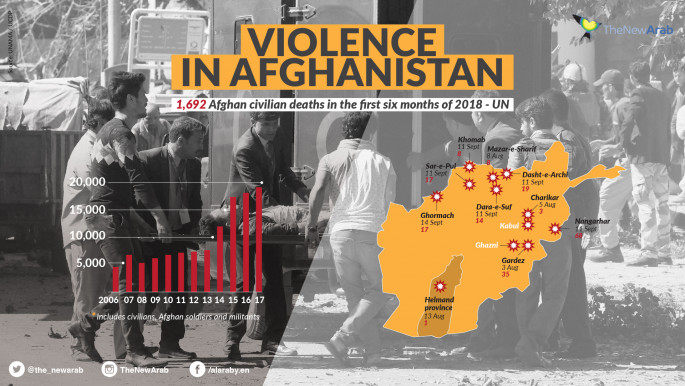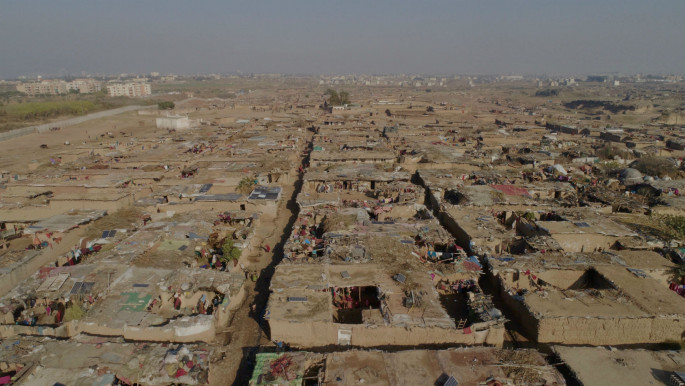Follow us on Facebook, Twitter and Instagram to stay connected
Afghan refugees tell UN: 'We need peace'
Afghan refugees tell UN: 'We need peace'
As Donald Trump attempts to broker a peace deal with the Taliban - one which is being heavily criticised - Afghan refugees remain sceptical.
4 min read
World leaders met at Islamabad to discuss Afghanistan [Getty]
Pakistan on Monday began a two-day conference attended by US peace envoy Zalmay Khalilzad and UN Secretary-General Antonio Guterres, meant to recognise 40 years of Afghans living as refugees.
Guterres told the conference that peace among the key players in Afghanistan was essential to fight extremism and prevent it from spreading and consolidating.
"We believe that if peace is established, if all key actors of Afghanistan come together than it would be possible to isolate terrorist groups and it will be possible to have a meaningful support in order to neutralise any terrorist activities in Afghanistan," Guterres argued.
Ministers and senior officials from around 20 countries are participating in the summit.
Also attending the conference is UN High Commissioner for Refugees Filippo Grandi, whose job would be to help the Afghans return home.
And as Washington leads in brokering a peace deal with the Taliban, Afghanistan refugees remain sceptical.
The US and the Taliban last week agreed as a first step to a temporary "reduction in violence".
Hukam Khan has been a refugee for 40 years when he fled Afghanistan after its war with the Soviet Union - where more than 5 million Afghans were forced to become refugees in Pakistan, driven from their homes by a bombing campaign so brutal it was referred to as a "scorched earth” policy.
Many refugees have already tried going back - lured by promises of help and hope from the international community and from Afghan President Ashraf Ghani - only to find there was neither food nor shelter for them.
Many also discovered they were no longer welcome in the villages they had left decades earlier.
"To tell you the truth, lots of money came to Afghanistan and every influential person, even the mullahs, stole that money," said Khan.
"The leaders are all traitors, they betrayed Afghans. The children of poor people got killed, while no leader lost his son."
Khan said he had a message for Guterres and for Grandi.
"We don't ask for much," he added.
Refugees were also at the mercy of European countries, many of whom shut down their borders or worse - forced them to return to the war-torn country.
Grandi called the forced return of refugees from Europe "shameful" in an interview with The Associated Press on Sunday.
"I do... fervently hope that the countries like Iran and Pakistan, who have hosted so generously... don't take their example from much richer countries that are shutting borders, not only to Afghans, but to many other refugees," he said.
Shah Wali, another elderly refugee, left his home in Surkhrud in Afghanistan's eastern Nangarhar province almost 40 years ago. He tried returning but found nothing left. What wasn't destroyed by war had been taken by neighbours and thieves.
But even the faint chance of peace has him hopeful.
"Give us peace and then we will go back," he said.
"Who doesn’t want to back to their homeland?"
Four decades of conflict
After four decades of war and conflict, more than 1.5 million Afghans still live as refugees in Pakistan, feeling abandoned by their own government, increasingly unwelcome in their reluctant host country and ignored by the United Nations.
If that truce should hold, the next step could be a long-sought-after agreement between Washington and the Taliban to end Afghanistan’s current war, now in its 19th year.
The agreement would return American troops home and start negotiations between the warring Afghans to bring peace to their shattered country.
US Peace envoy Zalmay, who brokered the Taliban deal spoke at the conference: "It is a terrible war ... and it needs to be brought to an end."
Read More: Iranian 'Traitors', Saudi 'Spies': Is Denmark the latest frontier of Tehran and Riyadh’s Cold War?
"We've made progress in the sense that we... are talking about the reduction of violence leading to the signing of an agreement between the United States and the Taliban that will open the door to Afghans sitting across the the table, one side by the government of Afghanistan and on the other by the Taliban of Afghanistan."
Poverty levels in Afghanistan are climbing. In 2012, 34 percent of Afghans were listed as below the poverty level, living on $1 a day. Today, that figure has risen to 55 percent.
Among locals, the camp is known as Kabobayan Camp, named for the many kabob shops that sprung up around it, most of which have long since disappeared.
"When there is peace, we should be provided with land on which we can build our homes first. Then we need to have food, and then we need to be able to build our schools, our shops and our mosques," he said.
Indrika Ratwatte, the UN human rights organisation’s regional director for Asia added:
"We know how resilient Afghans are," Ratwatte said. "If you give them that small opportunity, they will make it work."
"They will make it work. So we have to really ‘walk the talk' on the land allocation."
Guterres told the conference that peace among the key players in Afghanistan was essential to fight extremism and prevent it from spreading and consolidating.
"We believe that if peace is established, if all key actors of Afghanistan come together than it would be possible to isolate terrorist groups and it will be possible to have a meaningful support in order to neutralise any terrorist activities in Afghanistan," Guterres argued.
Ministers and senior officials from around 20 countries are participating in the summit.
Also attending the conference is UN High Commissioner for Refugees Filippo Grandi, whose job would be to help the Afghans return home.
And as Washington leads in brokering a peace deal with the Taliban, Afghanistan refugees remain sceptical.
The US and the Taliban last week agreed as a first step to a temporary "reduction in violence".
Hukam Khan has been a refugee for 40 years when he fled Afghanistan after its war with the Soviet Union - where more than 5 million Afghans were forced to become refugees in Pakistan, driven from their homes by a bombing campaign so brutal it was referred to as a "scorched earth” policy.
 |
Many also discovered they were no longer welcome in the villages they had left decades earlier.
"To tell you the truth, lots of money came to Afghanistan and every influential person, even the mullahs, stole that money," said Khan.
"The leaders are all traitors, they betrayed Afghans. The children of poor people got killed, while no leader lost his son."
Khan said he had a message for Guterres and for Grandi.
"We don't ask for much," he added.
Refugees were also at the mercy of European countries, many of whom shut down their borders or worse - forced them to return to the war-torn country.
Grandi called the forced return of refugees from Europe "shameful" in an interview with The Associated Press on Sunday.
"I do... fervently hope that the countries like Iran and Pakistan, who have hosted so generously... don't take their example from much richer countries that are shutting borders, not only to Afghans, but to many other refugees," he said.
Shah Wali, another elderly refugee, left his home in Surkhrud in Afghanistan's eastern Nangarhar province almost 40 years ago. He tried returning but found nothing left. What wasn't destroyed by war had been taken by neighbours and thieves.
But even the faint chance of peace has him hopeful.
"Give us peace and then we will go back," he said.
 |
|
An aerial view of a refugee camp, mostly populated by Afghans, in Islamabad, Pakistan [Getty]
|
Four decades of conflict
After four decades of war and conflict, more than 1.5 million Afghans still live as refugees in Pakistan, feeling abandoned by their own government, increasingly unwelcome in their reluctant host country and ignored by the United Nations.
If that truce should hold, the next step could be a long-sought-after agreement between Washington and the Taliban to end Afghanistan’s current war, now in its 19th year.
The agreement would return American troops home and start negotiations between the warring Afghans to bring peace to their shattered country.
US Peace envoy Zalmay, who brokered the Taliban deal spoke at the conference: "It is a terrible war ... and it needs to be brought to an end."
Read More: Iranian 'Traitors', Saudi 'Spies': Is Denmark the latest frontier of Tehran and Riyadh’s Cold War?
"We've made progress in the sense that we... are talking about the reduction of violence leading to the signing of an agreement between the United States and the Taliban that will open the door to Afghans sitting across the the table, one side by the government of Afghanistan and on the other by the Taliban of Afghanistan."
Poverty levels in Afghanistan are climbing. In 2012, 34 percent of Afghans were listed as below the poverty level, living on $1 a day. Today, that figure has risen to 55 percent.
Among locals, the camp is known as Kabobayan Camp, named for the many kabob shops that sprung up around it, most of which have long since disappeared.
"When there is peace, we should be provided with land on which we can build our homes first. Then we need to have food, and then we need to be able to build our schools, our shops and our mosques," he said.
Indrika Ratwatte, the UN human rights organisation’s regional director for Asia added:
"We know how resilient Afghans are," Ratwatte said. "If you give them that small opportunity, they will make it work."
"They will make it work. So we have to really ‘walk the talk' on the land allocation."

![Palestinians mourned the victims of an Israeli strike on Deir al-Balah [Getty]](/sites/default/files/styles/image_684x385/public/2024-11/GettyImages-2182362043.jpg?h=199d8c1f&itok=xSHZFbmc)


![The law could be enforced against teachers without prior notice [Getty]](/sites/default/files/styles/image_684x385/public/2178740715.jpeg?h=a5f2f23a&itok=hnqrCS4x)
 Follow the Middle East's top stories in English at The New Arab on Google News
Follow the Middle East's top stories in English at The New Arab on Google News

![Palestinian journalists in West Bank [Getty]](/sites/default/files/styles/image_330x185/public/2167088057.jpeg?h=a5f2f23a&itok=smdkN-46)
